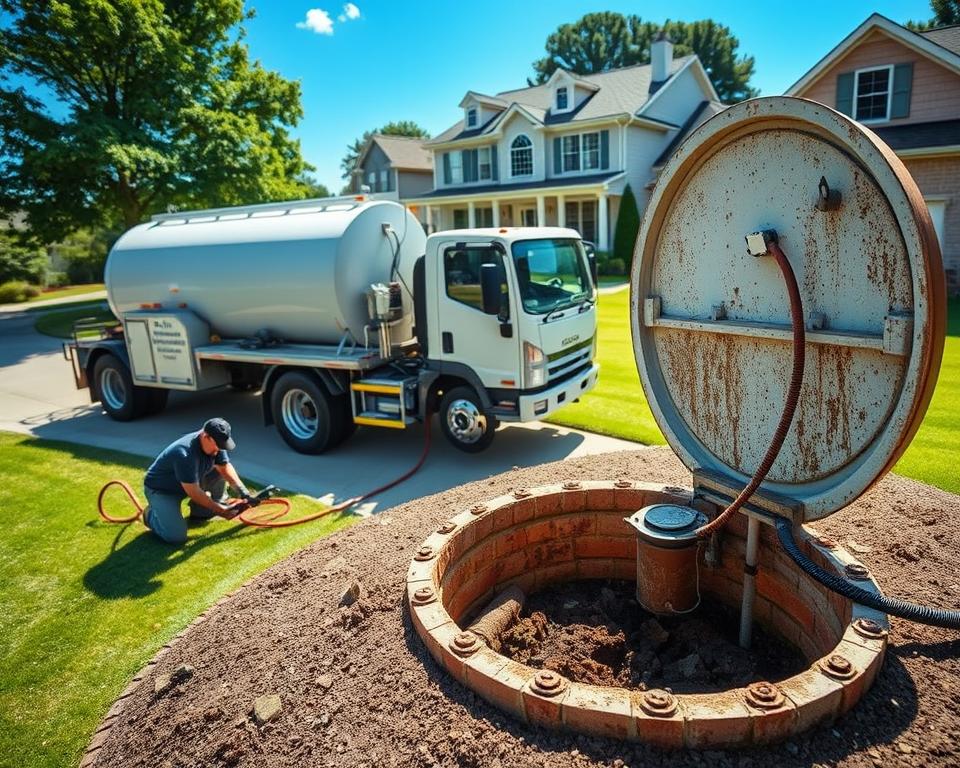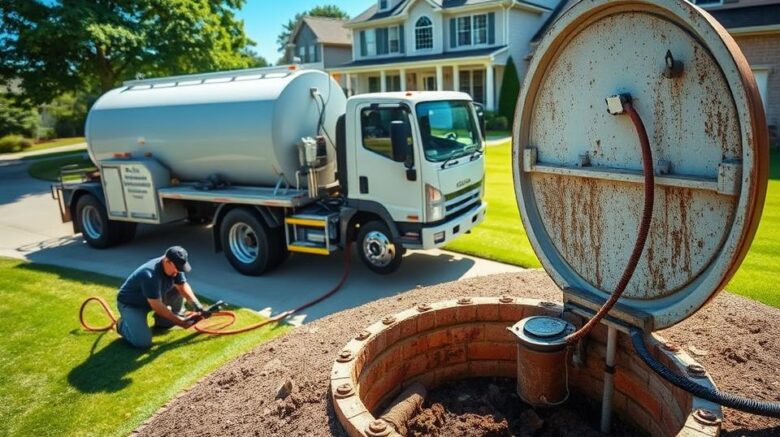Septic Tank Pump Out Procedure: Essential Guide & Tips
Have you ever thought about just where your household waste ends up after it drains from your sink or toilet? It’s managed by a carefully serviced septic system. Grasping the importance of septic tank pump-outs is essential for top-notch waste management in the household. Overlooking this could lead to backups and costly remedies. This guide seeks to show the value of septic servicing and scheduled pump outs. By utilizing trustworthy septic services – septic tank pumping cost near me, you protect your residence, the environment, and ensure your system’s longevity.
Key Takeways
- Routine septic tank pump out stops system failures and backups.
- Understanding your septic system helps with proper maintenance.
- Planning a pump out is essential for optimal waste management.
- Stay alert to signs that show your septic tank is due for service.
- Choosing a qualified service provider can boost system efficiency.
- Paying for septic tank cleaning services defends your home and the environment.
The Importance of Septic Tank Pump Out
Getting a septic tank pumping service periodically is key for your system’s life span and function. Over time, your tank collects solid waste and organic debris, that may cause performance issues or even complete system failure. Without septic system maintenance, you could face clogged pipes and failed drain fields – problems that typically come with steep expenses and significant inconveniences to owners.
By having professional septic tank services perform regular maintenance, you make sure your system functions properly. This practice not only avoids pricey overhauls but also safeguards the soil and groundwater around your home from pollution. Scheduling regular pump outs, you support environmental health and have a dependable and sound system for managing waste.
How Your Septic System Works
A standard septic system is central in handling household wastewater. It’s made up of the septic tank, drainfield, and soil – elements that work together to efficiently process waste. The septic tank serves as a contained space for solid waste to break down biologically.
It’s important for homeowners to grasp how these parts work. Keeping the septic system in good condition is vital to its longevity and effectiveness. Through routine inspections and cleaning the septic tank when necessary, owners can avoid expensive breakdowns that could cause serious health and environmental issues.
Regularly servicing your septic system secures your property and promotes public health. In the table below, find a table outlining the different septic system components and their functions:
| Component | Function |
|---|---|
| Septic Tank | Holds and decomposes solid waste through anaerobic bacteria. |
| Drainfield | Releases the treated effluent into the soil for further filtration. |
| Soil | Acts as a natural purifier to further treat wastewater. |
Appreciating these elements highlights the need for careful septic system care. Effective operation requires steady maintenance and cleanings by homeowners.
How Often Should You Schedule a Pump Out?
Understanding when to get your septic tank pumped is essential for its proper functioning. In most cases, a septic pump out should occur every few years. However, certain variables might change this schedule.
The number of people in your home heavily influences the pumping frequency. Extra residents mean more wastewater, creating a need for more frequent maintenance. Moreover, habits like excessive laundry or long showers might necessitate earlier pump outs. Acting promptly can notably improve your septic system’s life.
It’s wise to account for personal elements, such as tank size and daily water use, to keep a proper schedule. Remembering your last pump out date helps with timely planning for the next one, guaranteeing uninterrupted system performance.
Indicators It’s Time to Pump
Homeowners should be alert for signs that suggest their septic tank needs pumping. Slow-draining sinks and toilets often point to an overfilled septic system, reducing the wastewater flow. Moreover, foul smells around your home could mean trouble; they may come from the tank, indicating system failure.
Visible wastewater pooling in the yard is another significant indicator. If your lawn has waterlogged patches or unexplained puddles, it’s possible your septic system is overloaded. Dismissing these signs can escalate into more serious issues that disturb your home and become pricey to resolve.
To avoid serious complications, proactive maintenance is crucial. Engaging a professional service like All in Sanitation can be a savvy choice. They can precisely diagnose and address these signs. This strategy not only resolves immediate issues but also maintains your system’s efficiency and health.

Choosing a Professional Septic Tank Pump Out Service
It’s important to choose a competent septic tank pumping service to ensure your system running smoothly. Trustworthy companies know the local regulations well, guaranteeing your septic system satisfies all requirements. A reliable service, like All in Sanitation, is serious about disposing of waste properly. This is critical for the environment’s well-being.
When searching for the right septic service, think about these key factors:
- Experience and Reputation: Look for companies with positive feedback and long-standing success in your region.
- Licensing and Insurance: Ensure that your preferred provider possesses the proper license and insurance to cover unexpected problems.
- Comprehensive Services: Prefer a service that offers inspections with pumping, detecting issues before they get worse.
Investing in a quality septic tank pumping service avoids expensive future repairs. Routine evaluations and consistent upkeep maintain your system in optimal condition. Choosing wisely not only secures your investment but also maintains a robust waste management system for your home.
Septic Tank Cleaning: What You Need to Know
For homeowners, septic tank cleaning is vital to keep the system runs efficiently. During this process, removing sludge and scum is critical to stop blockages. A cleaned system not only performs optimally but also lasts longer. Conducting regular cleanings is important for the health of your system.
A lot of households request extra services to boost septic tank care. These add-ons are beneficial for removing harmful bacteria and stopping residue build-up. Recognizing the importance of proper maintenance can save you costly overhauls. Keeping up with maintenance secures both environmental safety and household well-being.
Pump-Out Pricing
Homeowners should know septic tank pumping costs for efficient system maintenance. Prices differ widely due to area, tank size, and preferred service provider. Typically, this service costs between $200 and $600. It’s smart to collect bids from various companies, evaluating both expertise and reliability.
Service providers like All in Sanitation offer fair rates. Yet, the cost of septic tank cleaning reflects service quality and thoroughness. Homeowners should weigh these aspects thoughtfully when choosing a service.
Evaluating quotes enables smart selections that match your budget and septic system needs. Understanding potential costs helps with financial planning for septic tank upkeep.
Homeowner Maintenance Tips
Maintaining your septic system properly is critical. It guarantees a durable and effective setup. By following simple steps, the longevity of your septic tank increases, while also saving money. Practices like minimizing water use in your household make a big difference. Fixing leaks promptly and opting for water-saving appliances are wise moves.
It’s essential to refrain from flushing harmful substances down the drain. Chemicals, fats, or things that won’t decompose hurt your septic system. For the wellbeing of your setup, dispose of such waste correctly. This method protects your septic tank’s natural processes.
Regular inspections and the occasional pumping are non-negotiable for septic maintenance. Plan to have your system inspected and serviced every three to five years. A maintenance schedule or checklist can be highly effective. It supports you in checking their system’s condition and sticking to maintenance guidelines.
Being proactive with septic maintenance delivers financial and environmental advantages. Through adopting these habits, homeowners enhance their septic systems’ efficiency and dependability. This dedication not only maintains your system but also promotes a healthier environment.
Wrapping It Up
A septic tank pump out is crucial for septic tank upkeep, and homeowners need to consider it earnestly. It prevents expensive repairs and extends the system’s lifespan, allowing for effective operation for years to come. Recognizing when to address system distress signals safeguards your property.
Choosing a proven provider, like All in Sanitation, changes the game in septic tank care. Their expertise ensures proper service, promoting both environmental health and your home’s comfort. Proactive maintenance guards your investment and supports a greener planet.
Staying informed about your septic system and its maintenance needs is key. Routine pump outs improve home functionality and bolster public health. For any homeowner, understanding the value of septic tank care secures a problem-free living environment for the future.
